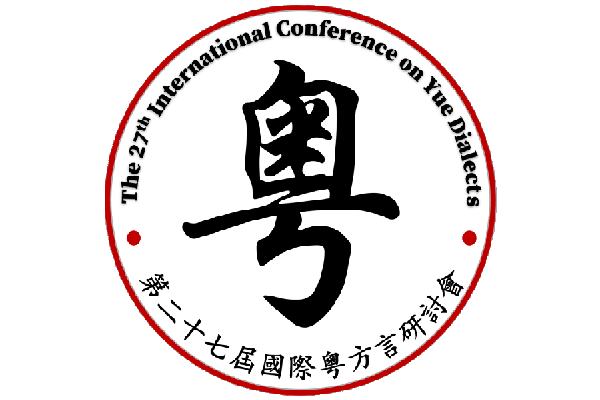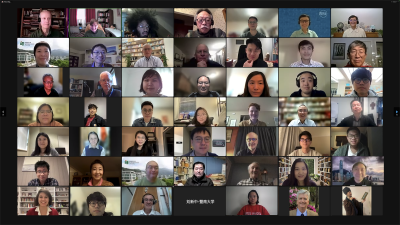DEALL’s Successful Hosting of The 27th International Conference on Yue Dialects (2023)

The 27th International Conference on Yue Dialects (第二十七屆國際粵方言研討會, https://u.osu.edu/yue2023/), hosted via Zoom by DEALL and held on three evenings that corresponded to the mornings of 1-3 December 2023 in East Asia, was a smashing success! The Ohio State University is honored to have been selected as the first overseas host of this prestigious international conference series, which was first organized in 1987 by the Linguistic Society of Hong Kong and the Chinese University of Hong Kong. Initially held biennially, this conference series soon became an annual event in 2005.
Recognizing the historical significance of Ohio State as the first overseas site for this conference series, faculty host DEALL Professor Marjorie Chan decided to hold the conference virtually via Zoom and to make it free and open to the public. The result: the online registration form closed with a whopping total of 224 registrants! If anyone thought that everyone is only interested in Standard Chinese based on Beijing Mandarin, they are very much mistaken!
Registrants include the organizing committee members, of course, as well as the three keynote speakers—Professors Dana Scott Bourgerie (Brigham Young University), Gina Anne Tam (Trinity University), and Holman Tse (St. Catherine University)—the presenters of the two Special Panels, the presenters in the nine panels of parallel sessions and, last but not least, the registrants who attended the presentations that interested them the most, be it to support their friend or professor, or to attend as many presentations as they could. While the schedule worked well for those in North America and East Asia, those residing in other parts of the world—especially those in Europe—had to sacrifice sleep in order to attend many of the sessions.
The 224 conference attendees, which include presenters, hail from a total of 79 institutions of higher learning in three continents: North America, Europe, and East Asia. Among the 79 institutions represented at the conference, 32 institutions are located in the U.S. and Canada: 27 in the U.S. across 14 states plus Washington, D.C. (California, Connecticut, Hawai’i, Indiana, Kentucky, Massachusetts, Michigan, Minnesota, New York, Ohio, Pennsylvania, Texas, Utah, Vermont and Washington, D.C.), and 5 in Canada, spread across 3 provinces from west coast to east coast: British Columbia, Alberta, and Ontario. Some attendees not affiliated with institutions of higher learning are students or teachers at several elementary and high schools; some are employees of such companies as Google or education-related firms, such as Pearson, Global LT, and Hills Learning; and others are self-employed, working in unrelated fields, or have retired and are simply pursuing their personal interests.
Attendees at various institutions from 5 different countries in Europe had also registered for the conference: United Kingdom (England and Scotland), France, Netherlands, Germany, Italy, Russia, Czech Republic, and Republic of Belarus. And in East Asia, attendees came from Japan, South Korea, China, including the two SARs, Macau and Hong Kong, with the most attendees and presenters from numerous institutions in Hong Kong. Even in China, attendees were from institutions not just from Guangdong but from 5 provinces: Shandong, Henan, Jiangsu, Zhejiang, and Guangdong. There were even two attendees from elsewhere in Asia: one from a university in Malaysia and one from a university in India. This conference was astonishingly international in scope!
At the same time, the registrants’ enthusiasm in anticipation of the conference can be seen in the reasons they gave for registering for the conference. Except for one blank and one “N/A,” the rest of the 224 registrants offered their reasons. Most students and research scholars expressed their interest to learn of the latest, cutting-edge research on Cantonese and other Yue dialects to broaden their horizons, and to upgrade and update their knowledge of Cantonese linguistics. Some of them have special interest in syntax, acoustic phonetics, sociolinguistic variation, and/or language-music interaction. Other registrants couched their interest based on Cantonese being their mother tongue or heritage language, while others who are teachers of Cantonese (or Mandarin Chinese) want to learn more about pedagogical tools, especially on the panel concerning AI. Significantly, one registrant observed, “I haven't found any presentations about Cantonese teaching in ACTFL and I want to update my knowledge about the trend of Cantonese teaching.” Another wrote, “I am a Chinese librarian and I want to learn how to preserve the Cantonese language through pedagogy and education.”
Other registrants include interpreters who wish to learn from the conference to help with their interpretation work. Some students show their enthusiasm with a few simple words: “I want to learn more about Cantonese :)” and “I am interested in the whole conference.” One very earnest undergrad student began a detailed discussion of their interest in the conference with the words, “My interest in attending the conference is derived from both my academic pursuits and personal journey. As someone actively learning Cantonese, I am fascinated by the semantic intricacies and sociolinguistic dynamics of Yue dialects,” ending the paragraph thus: “As I’m still new to sociolinguistics as an undergraduate student, I believe that attending this conference would not only give me sparkles about my current research, but also fulfill a personal aspiration to comprehensively understand the languages and social aspects intertwined with the Yue dialects.”
An OSU undergrad alum who had enrolled in our conversational Cantonese course (Chinese 4301) also offered some thoughts, “I am a previous student at OSU and I took Cantonese class, it was fun and I miss our school/class.” Another OSU alum now working as a research assistant in Hong Kong wrote, “I have been interested in Yue dialects and this is a good chance for me to learn more about the field. Moreover, I want to show my support for my teachers and friends at OSU and wish the 27th Yue dialects conference a great success!” Adding to these comments are words from a current OSU student: “[A]s a student of Mandarin, and as someone who is very interested in Chinese dialects (and particularly Cantonese, considering its importance both in China and in overseas Chinese communities), I am really looking forward to what Professor Gina Tam has to say about Cantonese and Cantonese-speaking communities. This is a topic that somewhat relates to my potential thesis topic, and I look forward to hearing her speak on the subject.”
In addition, we also received words of gratitude in the registration forms, such as, “Thanks for making the conference available online,” and a few simple words of appreciation, “Thanks much for organizing this.” One registrant showed appreciation by writing the following, “You made it available online. I identify as travel-unable, but I attend as many linguistics conferences as I can in order to learn more and to collect terminology.”
Among the attendees was a host of OSU alumni. Besides keynote speaker Dana Scott Bourgerie, a dozen OSU alumni attended, some assisting with organizing the conference, such as evaluating some conference abstracts, serving as time keepers or tech assistant with videorecording the presentations, some assisting with chairing sessions, and a few showing up out of interest and to support the event. They are: Mark Bender (alumnus and current DEALL chair who gave the welcoming remarks), Roxana Fung (Hong Kong Polytechnic University, retired), Skylor Gomes (independent scholar), Yawei Li (Berea College), Scott McGinnis (Defense Language Institute, D.C.), Junquan Pan (Chinese University of Hong Kong), Tsz-Him Tsui (Pearson), Jing Yan (Columbus Academy), Xuan Ye (Indiana University Bloomington), Ziying You (College of Wooster), Qianqian Zhang (independent scholar), and the most senior among them, Zheng-sheng Zhang (San Diego State University), who graduated in Linguistics in Spring 1988.
The 27th International Conference on Yue Dialects was made possible with support from our sponsors:
- Department of East Asian Languages and Literatures (DEALL)
- Graduate Students of East Asian Languages and Literatures (GREALL)
- Association for the Advancement of the Pedagogy of East Asian Languages (AAPEAL)
- Graduate Association of Chinese Linguistics (GACL)
- East Asian Studies Center (EASC)*
- Institute for Chinese Studies (ICS)
- Buckeye Language Network (BLN)
- Department of Linguistics
* This event is in part supported by a U.S. Department of Education Title VI grant to The Ohio State University East Asian Studies Center.
The conference is indebted to Professor Sze-Wing Tang, who assisted with the conference from behind the scenes on behalf of the Steering Committee of the International Conference on Yue Dialects. That included inviting the conference series’ convener, Professor Zhan Bohui (Jinan University), to give a pre-videorecorded welcoming presentation. The conference organizers also thank our keynote speakers, our two chairs who organized their special panels, as well as colleagues who cheerfully agreed to chair the panels in the parallel sessions. And, of course, we thank all the presenters and panel members who have chosen to participate in this event!
And last but not least, the conference would not have succeeded without the tremendous help and dedication from the members of the organizing committee, which included not only current faculty and students, but alumni and a few graduate students at other institutions, as shown on the conference website: https://u.osu.edu/yue2023/. Details of the conference program can be obtained from the conference program book that is available online. The conference also aims to publish a proceedings volume as part of the Buckeye East Asian Linguistics (BEAL) series through OSU Libraries’ Knowledge Bank, thus making the volume open access for anyone with internet access to retrieve it.
Thanks, everyone, for reading down to the end!

